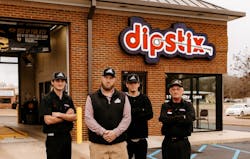SHOP STATS: Sayle Oil Company Locations: 14 in Mississippi. Average Car Count: 29 Staff Size: 85 Ticket Average: $66.25
The growth of synthetic oil sales has been so quick that it isn’t the “specialty” choice in lots of shops anymore.
But there’s no doubt that the industry is still in a transition. Plenty of drivers of older cars still want a budget-friendly conventional service. But shops are getting better at communicating the benefits of synthetic oils to customers, which is part of the current trend. It provides an impact to the ticket with inventory already on hand.
The Sayle Oil Company of Mississippi has had a successful growth of specialty oil sales. It operates 14 quick lubes under Dipstix, Shell Rapid Lube, and the Service Pro brand names, and boasts a rate of 57 percent for premium oils in full-service oil changes. That means full synthetic and high mileage varieties.
Sayle’s success lies in part in its training and customer education strategies, which involve a different look at the sales dynamic.
“I tell my guys: We don’t ever want to be salesmen,” says company director Jeffrey Crafton. “We want to be more like consultants.”
The Challenge
It’s similar for any quick lube. As customers are stretching their service intervals, it’s important to make every sale impactful. One of the most efficient ways to boost tickets is through the products and services already on hand, and premium oil is a prime example.
Often, techs are dealing with customers who are resistant to switching from conventional oil or those who are unsure about the added cost.
The Solutions
Keep training consistent with video.
It’s crucial to train your managers and techs so that they maximize their time with customers. One of the first things Sayle does with new quick lube recruits is familiarize them with oil manufacturer information.
Sayle is also an oil distributor, so there is a wealth of knowledge and a direct link to the oil companies close by. But Crafton says the brands wanted to add more to the company-level training.
“Once we get finished with that, we’ve got our own training videos that we’ve been working on for the past year or so,” he says.
Those videos are more specific to Sayle’s company culture, but Crafton says the real benefit is that it allows the company to scale up and retain the same training program across all shops. It puts less strain on shop managers as well.
“We figured the way that we can help these guys out and make sure the guys are trained the same way,” Crafton says.
With the addition of in-person training, techs can get started with a more complete base of knowledge.
Always be selling helping.
Operators are always talking about how they never sell customers services that they don’t need. That’s a commendable approach, but successful shops still rely on consistent sales growth.
Crafton’s method is the best of both worlds. That’s the consultant mindset.
If a customer comes in with a General Motors vehicle that requires Dexos oil, that’s something his techs are trained to point out. The information is part of the sale, but it’s crucial knowledge for the vehicle owner as well.
“When you buy a car at the dealership, they don’t explain that,” Crafton says. “So they’re kind of shocked when they come in and we tell them.”
If customers are still not sure, techs will ask customers to pull out the owner’s manual and help them find that information. Coupled with the scripted information about the benefits of synthetic oil, the consultant strategy is a more friendly approach.
“Quick lubes get a bad name sometimes. Everyone thinks you’re just out there trying to upsell them,” he says. “Let them make the decision. That way, they don't feel the pressure.”
The Aftermath
Sayle has been building its sales strategies for years, but the in-house video training was a boost at the growing company. Its quick lubes had a record 2020 for car counts and had more than half—57 percent—of full-service oil changes done with premium oils.
At one location, the rate was 86 percent.
The difference is made when techs take the time to explain to customers how their vehicles benefit.
“You're taking care of the customer whenever you recommend a premium oil change,” Crafton says.
The Takeaway
Crafton says that one of the company’s goals for 2021 is to bring its systemwide premium oil sales to 67 percent. It’ll get there by building on the current system.
There are the fundamental lines that all techs should know—synthetic oil aids in performance and engine health.
But it’s the approach that will make or break a sale. Make sure your techs are empowering customers while selling.






